Blocked radiators can be a significant issue in any heating system. They can lower your heating system’s efficiency. This causes uneven heating, higher energy costs, and possible boiler damage. Early recognition of blocked radiators can save you time and money. It can also prevent discomfort. This guide covers blocked radiators. It explains their symptoms, causes, and how powerflushing services can fix them.
Understanding Blocked Radiators
Blocked radiators happen when sludge, rust, or debris build up inside them or the plastic pipe. This buildup restricts hot water flow. Some radiator areas stay cold, hurting your heating system’s performance.
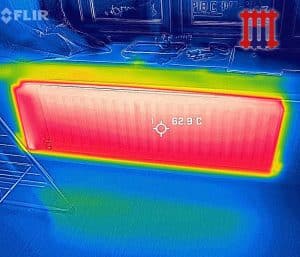
Common Symptoms of Blocked Radiators
Here are some common symptoms that may indicate blocked radiators in your home:
Cold Spots on Radiators
Cold spots could mean blocked radiators. You may notice that the bottom of your radiators is cold while the top remains warm. This indicates a blockage. Cold areas on your radiators result from poor hot water circulation. It leads to ineffective heating.
Noisy Boiler
Does your boiler make a noise? Gurgling, whistling, or banging sounds from your boiler can spell trouble. These signs highlight clogged water flow, possibly due to trapped air or debris. As a result, there is a lack of proper water circulation in your central heating. There may be blockages in the radiators or pipes.
Slow Heating
If your home takes a long time to heat up, it may be due to blocked radiators. Blockages in circulation prevent hot water from reaching your heating system. This causes a delay in heating. Some rooms may warm up faster than others. This may mean a blockage in the radiators serving those areas.
Increased Energy Bills
If you notice a spike in your energy bills, blocked radiators could be a contributing factor. A blockage makes your boiler work harder to maintain the temperature. This increases energy use. This inefficiency can raise heating costs. So, Blackpool power flushing is necessary to restore your system’s efficiency.
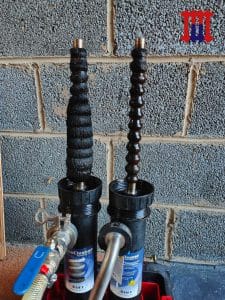
Causes of Blocked Radiators
Knowing the causes of radiator blockages can help you prevent them. Here are some common reasons why radiators become blocked:
Sludge Build-Up
Over time, natural corrosion occurs within your heating system. It releases iron oxide, known as sludge. This sludge settles in the radiators and pipes, leading to blockages. Older systems are especially prone to this issue. They have years of accumulated corrosion.
Air Traps
Your central heating system can trap air, leading to ineffective circulation. Air pockets in the pipes or radiators can block hot water flow. This causes cold spots and inefficient heating.
Ineffective Maintenance
Neglecting regular central heating maintenance can result in blockages. Failing to bleed radiators or check for signs of wear and tear can lead to sludge build-up and air traps. Keep your system well maintained. This will prevent blockages and ensure peak performance.
Poor Installation
Improper installation of your heating system may lead to blockages. Improperly installed pipes or misaligned radiators can create low-flow areas. Sludge and debris can then accumulate there.
Hard Water Deposits
In areas with hard water, mineral deposits can clog your central heating system. These deposits can clog pipes and radiators. They can block water flow and cause heating issues.
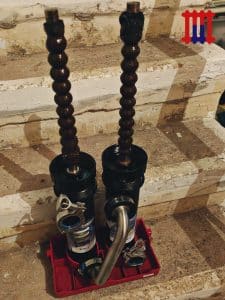
What to Do About Blocked Radiators: How a Power Flush Can Help
If you suspect a blockage in your radiators, you must act. Here are some steps to follow:
Bleed Your Radiators
Start by bleeding your radiators to release any trapped air. Use a horizontal radiator key to open the bleed valve slightly until water starts to flow. Be prepared for some dirty water if there’s significant sludge present.
Check the Valves
Ensure that all the radiator valves are functioning correctly. Sometimes, a valve may be partially closed, restricting the flow of hot water. Adjust the valves as necessary to maximize flow.
Consult a Heating Engineer
If bleeding the radiators and adjusting the valves don’t work, consult a heating engineer. They can inspect your central heating system and recommend a fix.
Consider a Power Flush
A powerflush clears blockages and sludge from your heating system. It’s an effective solution. This process uses high-flow water to remove debris from the radiators and pipes. A professional engineer can do this. They will restore your heating system to peak performance.
Regular Maintenance
After fixing any blockages, maintain your heating system regularly. Schedule annual inspections and maintenance to prevent the recurrence of blocked radiators. Bleed your radiators regularly. Consider adding a magnetic filter to catch debris before it can build up.
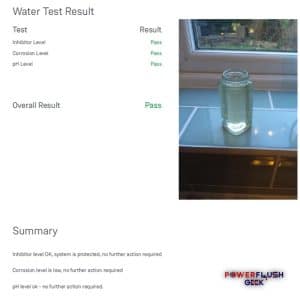
Understanding Radiator Sludge
What is Radiator Sludge?
Radiator sludge is a buildup of debris, rust, and minerals. It can accumulate in your central heating system over time. This sludge usually forms from corrosion in the central heating pipes. It can cause problems, including blockages in the heating system.
Radiator sludge restricts hot water flow. This causes uneven heating in your home. It’s crucial to manage and remove this sludge. It keeps your central heating system efficient.
Causes of Radiator Sludge
Several factors can contribute to the formation of radiator sludge:
- Corrosion: Metal parts in the central heating system can corrode over time. This may release rust particles from the radiators and pipework.
- Hard Water: Hard water areas can see more mineral deposits. They can cause sludge.
- Inadequate Maintenance: Lack of upkeep can allow sludge to build up undetected in your heating system.
How to Remove Radiator Sludge
To effectively remove radiator sludge from your system, consider following this step guide:
- Bleed Your Radiators: Use a radiator bleed key to open the bleed valve on your radiators. This will help release trapped air and any initial sludge buildup.
- Check for Blockages: After bleeding, look for cold spots on your radiators. They may indicate blockages.
- Flush the System: If cold spots persist, you may need to perform a power flush to remove the sludge from the heating system. This process uses a cleaner for central heating systems. It breaks down the sludge effectively.
- Install a Central Heating Filter: To prevent sludge buildup, install a central heating filter. This will capture debris before it can accumulate within the system.

Addressing Blockages in Your Central Heating System: Blocked Radiators or a Noisy Boiler
Recognizing Blockages
Blockages in your central heating can cause serious issues. So, it’s essential to find and fix them quickly. Common signs of a blockage include:
- Uneven Heating: A blockage in the central heating can cause the radiators to heat unevenly.
- Noisy Boiler: Blocked pipes can strain your boiler, leading to gurgling or banging noises.
- Increased Energy Costs: Blockages can cause your heating bills to rise. As a result, your central heating system has to work harder to maintain the desired temperature.
How to Remove Blockages
To remove blockages from your central heating system, consider these steps:
- Bleed Radiators: Start by bleeding your radiators to release any trapped air. This can help alleviate minor blockages.
- Check Valves: Make sure the thermostatic radiator valve on each radiator works and is not blocked.
- Consider a Power Flush. If bleeding does not help, a power flush may be needed to clear blockages in the pipes. A professional can perform this service to ensure thorough cleaning.
- Regular Maintenance: Schedule regular maintenance to prevent future blockages. This may include using a central heating cleaner or inhibitor to maintain a clean system.
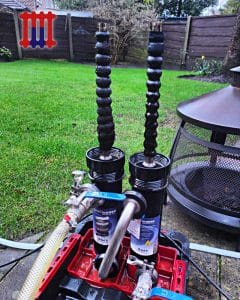
Comments and Tips for Maintaining Your Central Heating System
Importance of Regular Maintenance
Regular maintenance is key to preventing issues with your central heating system. Here are some posts, comments and tips to keep your heating efficient:
- Schedule Annual Inspections: Hire a qualified plumber to inspect your system. This can catch problems before they escalate. Contact a plumbing company and show them the affected radiator feet.
- Use Quality Cleaners: Use quality cleaners and inhibitors made for central heating systems. They will keep them running smoothly.
- Consider Upgrades: You must upgrade an outdated system. More efficient options, like electric radiators or heat pumps, can help. They improve efficiency and reduce sludge buildup.
Understand the issues with radiator sludge and blockages in your heating system. You can then take steps to maintain heating system efficiency. Clean and maintain your system. It will ensure consistent heating, whether you have horizontal, column, or vertical radiators.
For help with your central heating system, please reach out. You can find many people sharing posts about this issue. Regular maintenance and quick action on issues will help you enjoy a warm, comfortable home.
Regular maintenance of your central heating system is vital for its longevity. Using cleaning chemicals made for central heating systems can help. They can remove sludge and other contaminants. This process, called a power flush, removes unwanted particles. They may block your radiators and pipes.
Practical Steps for Maintaining Your Heating System
- Switch the System Off: Please switch the system off before you start maintenance.
- Drain the System: Next, you must drain the system. Keep a bucket or old towels on hand to clear up the water that flows out.
- Add the Inhibitor: After draining, add the corrosion inhibitor to the header tank or system, as instructed. This will help prevent future corrosion and blockages.
- Check for Leaks: After adding the inhibitor, inspect all wall connections and pipework for leaks. If you find any, it’s best to consult a qualified gas engineer to resolve the issue.
- Refill and bleed the radiators. Once you check and secure everything, refill the system with clean water. Then, use a radiator bleed key to release any trapped air. This will help ensure your radiators function efficiently.
- Monitor Regularly: Watch your system’s performance. Repeat this maintenance yearly or as needed.
The Importance of a Corrosion Inhibitor
You must use a corrosion inhibitor in your central heating system. As the name suggests, the inhibitor prevents rust and corrosion from damaging the metal parts. This is vital in systems with central heating pipes of various metals. The corrosion inhibitor serves as a protective layer. Using one can enable you to extend the useful life of your central heating pipework.
Keeping Your Heating System Efficient
Blocked radiators can cause major issues in your heating system. Early recognition of the symptoms can help prevent these problems. You can keep your heating system efficient. Stay vigilant and take action. Bleed your radiators and consider a power flush.
If you suspect blocked radiators, contact a heating engineer. They can inspect your home and recommend the best action. This will keep it warm and comfortable all winter. Search for an effective service for drain and other issues, and you will find Powerflush Geek.
For info or to schedule a power flush, contact Powerflush Geek at 07 444 203 403 or email info@powerflush-geek.co.uk. Don’t let blocked radiators disrupt your comfort. Act today to keep your heating system running.

FAQs (Frequently Asked Questions)
1. How do you clear a blocked radiator?
A power flush is the most effective way to clear a blocked radiator. You can try bleeding the radiator and see whether that solves the problem or not. If it doesn’t, you must consult a heating engineer. They may need to do a good flush to remove any blockages.
2. How do you clear blocked radiator pipes?
A central heating power flush can often clear blocked radiator microbore pipes. The engineer will push clean water through the system at high pressure. The water will dislodge rust, debris, and heating sludge completely. You must hire a professional for this job.
3. Why do radiators get blocked?
Column radiators could face blockage for several reasons. For instance, trapped air, hard water deposits, and corrosion can all cause sludge to build up. You must perform regular maintenance on your radiators.
4. What are the symptoms of a blocked radiator?
The common symptoms include:
- Cold spots on the radiator.
- Unusual noises from the boiler.
- Slow heating times.
- Dirty water when bleeding.
- High energy bills.
If you spot any of these signs, take prompt action to prevent escalation.





